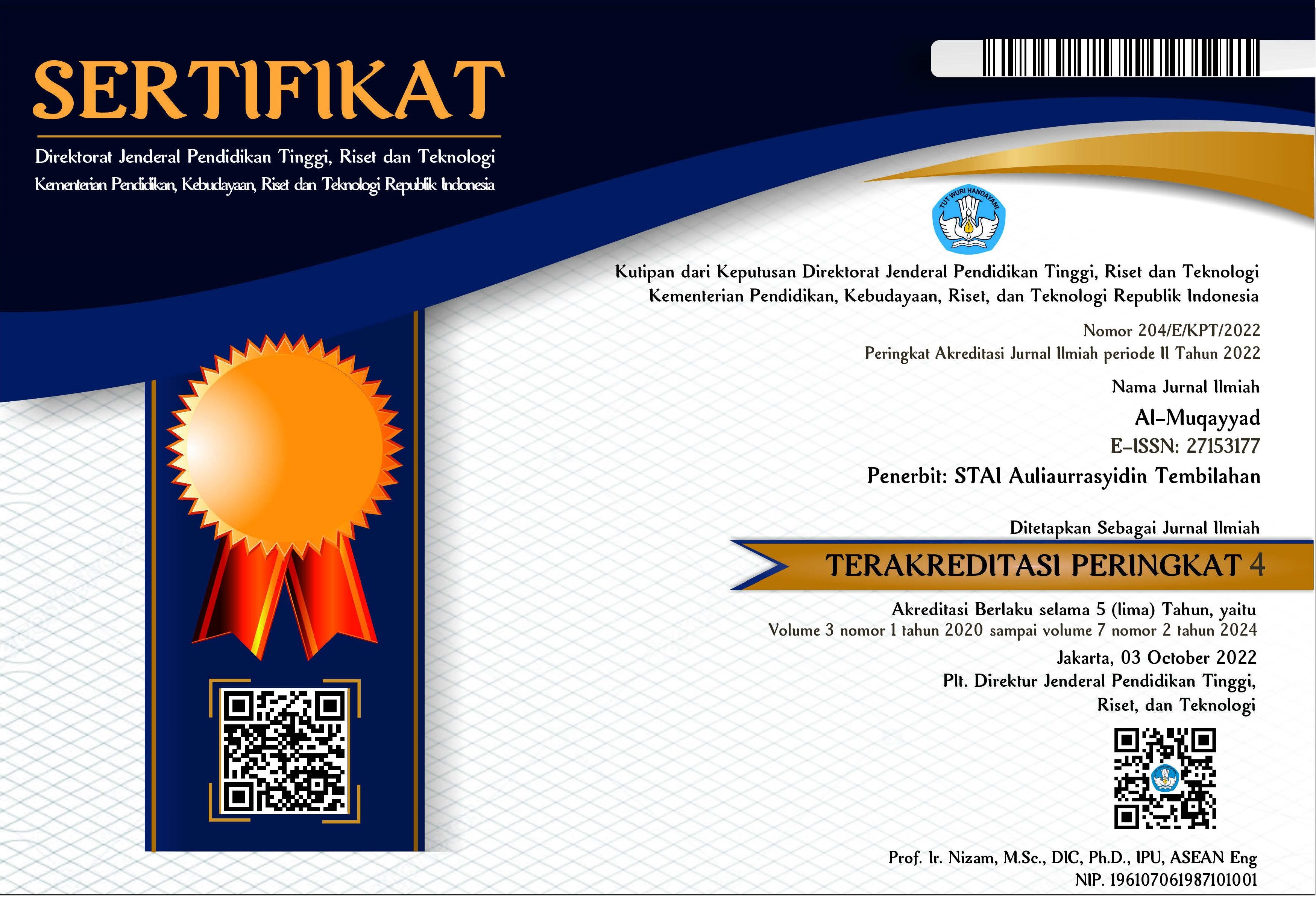Konsep Istikhlaf dalam Etika Bisnis Islam
DOI:
https://doi.org/10.46963/jam.v6i2.1299Keywords:
Ikhtilaf, Ethics, Business, IslamAbstract
This research aims to examine the concept of istikhlaf in business ethics and what impact it has on business people. This research is of the type of library research or library research using qualitative methods by carrying out content analysis using the Content Analysis model. The results of the research show that the concept of istikhlaf is related to divinity, prosperity and justice. Business people must have fundamental attitudes/ethics and character, namely honest, trustworthy, informative, intelligent and intellectual, professional, motivational, critical, communicative, disciplined, fighting, innovative, adaptive and committed. Business actors are prohibited from behaving Al-bathil, Al-Fasad, Al-Zhalim which can cause imbalance and injustice in business. In this way, the character contained in istikhlaf influences behavior, so that it can reduce or even eliminate/inhibit negative behavior and bad ethics in business people. By embedding istikhlaf in business people, good, wise behavior, loss of selfish attitudes, more tolerance, careful use of assets (not causing waste), careful in policies so that the business game will be safer and more peaceful, competitive fair, and become a social homo economicus, not a lupus homo homini.
Downloads
References
A Karim. A. (2014). Bank Islam (Analisa Fiqih dan Keuangan), Jakarta: PT.RajaGrafindo.
Akbar. A. (2012). Konsep Kepemilikan Dalam Islam, Jurnal Ushuluddin. XVIII (2), 124-140
Al-Qordhawi. Y., ter: Zainal Arifin. (2021). Norma dan etika Ekonomi Islam, Jakarta:Gema Insani.
Barus, Dana Syahputra. (2022). Teologi Ekonomi Islam, Medan:CV.Merdeka Kreasi Group.
Dewan Pengurus Nasional Fordebi dan Adesy. (2016). Ekonomidan Bisnis Islam “Sri Konsep dan Aplikasi Ekonomi dan Bisnis Syariah, Jakarta: PT.Raja Grapindo
Dewan Pengawas Syariah Wilayah IV Jawa Timur, Bali, Nusa Tenggara. (2016). Kumpulan Khotbah Bisnis dan Keuangan Syariah, Surabaya: OJK.
Dumairy. (2020). Konsep istikhlaf- Tawaran Ekonomi Islam bagi Penyemaian Etika Bisnis dan Ekonomi Artikel, https://www.researchgate.net/publication/344461880.
Hanifa, Aulia. (2023). Konsep Kepemilikan Individu Dalam Islam, Journal Economicc Busniss Ethic and Science Hestories (Jebesh), 1 (1), 62-69
Hasanudin, Fuat. (2020). Review Buku Maqasid al- Syari’ah Ibnu ‘Asyur: Rekontruksi Paradigma Ushul Fiqih, Jurnal Abhats, 1 (1), 172-187
Masrina, dkk. (2023). Konsep Harta dan Kepemilikan dalam Perspektif Islam, Jurnal Ilmiah Ekonomi Islam (JIEI), 9 (01), 30-35
Maharani,Septiana Dwiputri. (2016). Manusia Sebagai Homo Economicus:Refleksi Atas Kasus-Kasus Kejahatan di Indonesia, Jurnal Filsafat, 26 (1), 30-52
Muhammad, Ismail Yusanto. (2008). Menggagas Bisnis Islami, Jakarta: Gema Insani.
Rahmadhany, Nurmeiny Putri, dkk. (2023). Analisa Penerapan Prinsip Etika Bisnis Islam Terhadap Usaha Mikro Kecil dan Menengah (UMKM) pada Rozza Bakery Palembang, Jurnal Jimpa, 3 (1), 13-25.
Sainul, A. (2020). Konsep Hak Milik Dalam Islam, Jurnal Al-Maqasid: Jurnal Ilmu-Ilmu Kesariahan dan Keperdataan, 6 (2), 196-208
Subagyo, A. (2009). Kamus Istilah Ekonomi Islam “Istilah-Istilah Populer dalam Perbankan, Bursa Saham, Multifinance, dan Asuransi Syariah, Jakarta: PT.Elex Media Komputindo
Sobarna, N. (2021). Konsep Kepemilikan dalam Etika Islam Menurut Taqiyuddin an-Nabani, Jurnal Ilmiah Ekonomi dan Keuangan Syariah, 2 (2), 107-118
Untung, B. (2012). Hukum dan Etika Bisnis, Yogyakarta:CV.Andi Offset: Yogyakarta.
Wati, Destia, dkk. (2022). Analisa Penerapan Prinsip-Prinsip Etika Bisnis Dalam Transaksi Jual Beli Online Di Humaira Shop, Jurnal Kajian Ekonomi dan Bisnis 5 (1), 141-154.
Yosephus, L. S. (2010). Etika Bisnis; Pendekatan Filsafat Moral Terhadap Perilaku Pembisnis Kontemporer, Jakarta: Obor Indonesia: Jakarta.
Zumroh. (2017). Bisnis Haram dan Pengaruhnya Terhadap Fisik dan Pisikis Manusia, Jurnal Mizan:Wacana Hukum,Ekonomi dan Keagamaan, 4 (2), 149-158.
Downloads
Published
Issue
Section
License
Copyright (c) 2023 Nurhasanah Nurhasanah, Arfah Arfah, Ein Maria Olfa

This work is licensed under a Creative Commons Attribution-ShareAlike 4.0 International License.
Authors who publish with this journal agree to the following terms:
1. Copyright on any article is retained by the author(s).
2. The author grants the journal, right of first publication with the work simultaneously licensed under a Creative Commons Attribution shareAlike 4.0 International License that allows others to share the work with an acknowledgment of the work’s authorship and initial publication in this journal.
3. Authors are able to enter into separate, additional contractual arrangements for the non-exclusive distribution of the journal’s published version of the work (e.g., post it to an institutional repository or publish it in a book), with an acknowledgment of its initial publication in this journal.
4. Authors are permitted and encouraged to post their work online (e.g., in institutional repositories or on their website) prior to and during the submission process, as it can lead to productive exchanges, as well as earlier and greater citation of published work.
5. The article and any associated published material is distributed under the Creative Commons Attribution-ShareAlike 4.0 International License





2.png)



